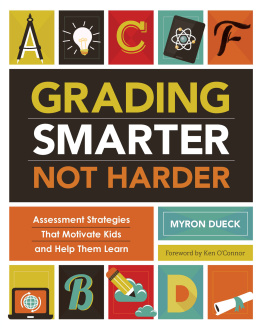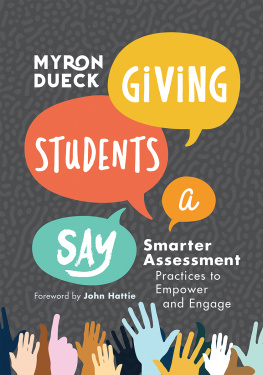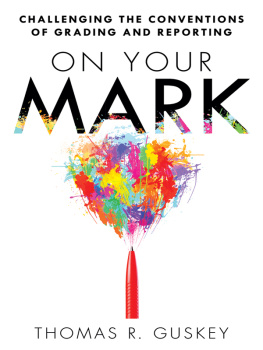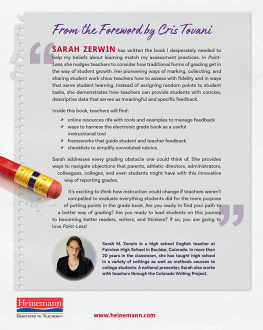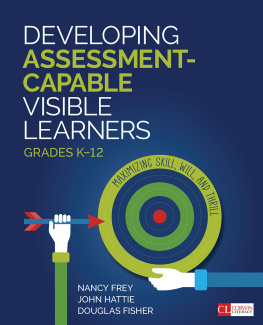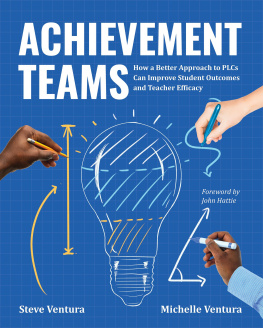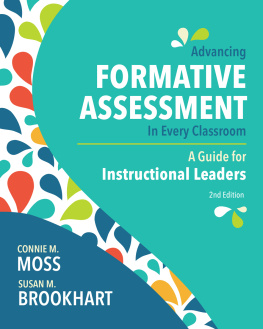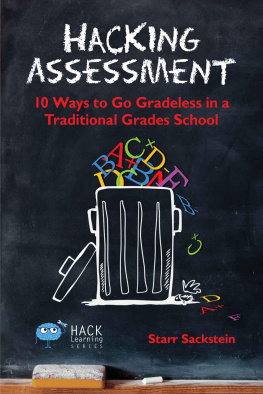To Elijah and Sloanekeep learning, keep exploring.
In memory of Diane.
Acknowledgments
....................
Writing a book was more of a challenge than I could have ever imagined. Though the process takes hundreds of hours spent in quiet contemplation, much of the final product is due to the contributions and guidance of others. It is with incredible gratitude that I take the time to acknowledge them here.
Students: Students have provided me with invaluable feedback and the opportunity to continue my quest to be a better educator. I thank you for your honesty, your criticism, and your willingness to try something new; without you, none of my work would have mattered at all. I am especially grateful to the at-risk learnersmany of whom I mention in this bookwho, despite feeling vulnerable, take on the challenge of learning.
Educators: The tough questions provided by educators have undoubtedly helped me to better understand and articulate the complexities, challenges, and solutions related to grading and assessment. A special thanks to those educators in both Canada and the United States who contributed templates or ideas discussed in this book: Ben Arcuri, Shona Becker, Chris Bradley, Scott Harkness, Karl Koehler, Cindy Postlethwaite, Russ Reid, Doug Scotchburn, Naryn Searcy, Chris Terris, Geoff Waterman, and Lisa West. Over the past seven years, School District 67 in British Columbia has provided me a wealth of opportunities, and I am very fortunate to have such incredible colleagues.
Assessment Leaders: A number of people have been instrumental to my grading and assessment journey. Ken O'Connoryou have provided the solutions to the problem of broken grades and paved the way to amassing credible data related to standards-based assessment; thank you for being a friend, mentor, and sounding board for me on many occasions. Your willingness to write the foreword to this book leaves me indebted. Rick Stigginsyou are an assessment icon and you have established the benchmark for continuing the conversation on grading and assessment. Jan Chappuis, Jacob Bruno, and the rest of the Assessment Training Institute teamyour conferences and training have provided a stage upon which educators can continually hold meaningful discussions on grading and assessment. Tom Schimmeryou played an absolutely critical role in starting me down the path toward sound assessment, and your suggestion that I write down the feedback from my students was arguably the best advice I ever received. Without your leadership at Princess Margaret and your willingness to engage in tough conversations, I just can't see how I would have ventured this deep into the assessment conversation. If your challenge to other educators is as effective for them as it was for me, your impact on assessment will be global.
School Leaders: Bill Bidlakethank you for providing opportunity and support for educators willing to take risks. Terry Grady and Don MacIntyrethank you for being incredible mentors and for providing a venue for my comments when I felt most frustrated. Wendy Hyerthanks for the professional and personal support in my growth as a leader both inside and beyond our school district.
Book Production: Dianne Hildebrandyou taught me English in 12th grade, and who would have thought you would come to my rescue in the process of editing my book? Genny Ostertag and Ernesto Yermoli at ASCDI couldn't have asked for better people to guide me through my first book. Your feedback and direction are what made this book go from a collection of thoughts to a finished productthank you!
Friends: Chris Van Bergeyk and Todd Manuelyour constant moral support, questions, and thoughts through the writing of this book were more helpful than you realize. Russ Reid and Cindy Postlethwaitethank you for being the two teachers to whom I could run for reassurance when I needed it most. Jeremy Hiebertthanks for reminding me that a mountain bike ride makes for a great educational conversation. Ben Arcuriyour unabashed honesty and eye for criticism has kept me on track many times. Thanks for the support and your authentic approach to educational confrontation. You personify the saying, "Growth comes from being surrounded by critical friends."
Family: Dianethank you for showing me that the value of taking on a challenge is not measured by win or loss, but by the way in which we tackle it. You were one of my strongest supporters, and I wish I could have shared the completion of this project with you. Benthanks for mentoring me on divergent thinking and looking at situations from an angle not yet considered. Dadthanks for decades of instilling in me the belief that no problem is without a solution. Momthanks for showing me how to care for others, and also for the piano lessons; I am now able to sit and work for hours even though I would rather be doing something else. Kevthanks for a lifetime of fun, debate, reflection, and challenges. And finally, Tracey, Elijah, and Sloaneyou provide me with ample support and honest feedback, and for that I am eternally grateful. Elijah and Sloane, you have taught me much about different learning characteristics, as well as what works and what doesn't when it comes to motivation and consequences. Thank you for being both understanding and patient while "Daddy works on his book." Tracey, I do not have enough words to express my thanks. This assessment journey is not what you signed up for, but your never-ending support has made it so much easier. Thank you for being my partner and friend.
Foreword
....................
Have you read books that made you both laugh and cry? How often can you say this about a book on assessment and grading? My guess is that for most educators, the answer is along the following lines: "You have to be jokingassessment and grading are serious aspects of teaching and learning. Books on those topics affect me professionally and intellectually, not emotionally." But professional content that affects us emotionally provides us with a deeper sense of connection to it and is far more likely to have a positive influence on our professional beliefs and practices.
This book made me both laugh and cry. I wish I had been able to read it 47 years ago, before I began my first year of teaching. The stories Myron tells about teachers and students speak powerfully both to the positive effects that assessment and grading can have when they are done well and to the negative effects that ensue when they are done badly. Sadly, the latter is true for most traditional approaches to assessment and grading.
In many ways, Myron's path reflects my own journey from rookie teacher to classroom veteran to consultant on assessment and grading. Fortunately for Myron and his students, his epiphanies and resulting changes to practice have happened while he is still in the classroom; unfortunately for me and my students, most of my epiphanies happened after I had left the classroom. Please don't get the wrong ideaI believe that I was a good teacher most of the time, but thanks more to an intuitive sense of what's good teaching and what's good for learning than to any teacher preparation program or professional development course. As I see it, one of the biggest problems with teacher education programs is the lack of courses on assessment and grading. Even when such courses are available, they are often not required for graduation and they rarely include any information about grading. Until recently, the same has been true of most in-service professional development offerings. In either a preparatory or professional-development context,

